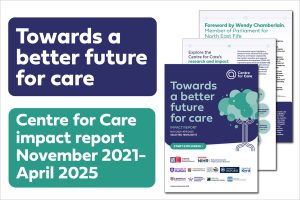I am an MSc and PhD student. My MSc is in data analytics, and I am using these skills to research the financial costs of unpaid care. I work closely with the Office for National Statistics and use Census data. I was fortunate enough to have an internship with the ONS earlier this year to learn from the experts about using Census data in research. As part of this internship, I worked with the Social Care Analysis team in Health Analysis and Life Events (HALE) to conduct research into the relationship between providing unpaid care and home ownership.
The ONS publication for this research can be found here. Unpaid care is generally defined as some variation of:
“doing things for people that they cannot do for themselves, and personal care tasks such as lifting, toileting, and washing” (Twigg and Atkin, 1994) without financial compensation.
Scholars have suggested it is part of human nature to care and require care (Tronto, 2017). Research has shown that providing unpaid care is “positive and rewarding” (Carers Trust, n.d.) and that many people gain happiness from it (Brouwer et al., 2005). However, unpaid care can have negative impacts. Previous research has shown that unpaid carers experience several types of financial cost such as losing pay due to taking time off work, withdrawing from the labour market, and out-of-pocket costs from having to purchase goods and services to support the care-receiver (Glendinning et al., 2009, p18). Home ownership is a relatively under-researched area regarding unpaid care which can reflect a tangible implication of these financial costs. Since so many unpaid carers experience income loss due to the care they provide, this research aims to explore whether this is reflected in unpaid carers’ ability to own a home.
This research uses data from the 2011 Census to explore how unpaid carers compare to non-carers in housing tenure, and how home ownership varies by hours of unpaid care provided per week. For this research, following the Census questionnaire, an unpaid carer is defined as anyone who looks after or provides “help or support to family members, friends, neighbours, or others because of either:
- long-term physical or mental ill-health/disability?
- problems related to old age?”
As part of the analyses, I use an empirical approach that accounts for important background characteristics of people that are known to affect unpaid care and home ownership: sex, ethnicity, age, socio-economic status, and household composition.
Research findings
The main findings of this research are:
- “… unpaid carers were 3.5% less likely to own their own home than non-carers, this difference was statistically significant”.
- “… unpaid carers who provided between 20 and 49 hours of care per week, and those who provided 50 or more hours of care per week were 47.1% and 62.5% less likely (respectively) to own their own home than those who provided between 1 to 19 hours of unpaid care; these findings were statistically significant” (ONS, 2022)
These are important findings for future research into unpaid care. Unpaid carers are less likely than non-carers to own their home, but much larger differences are seen between unpaid carers based on how many hours of care they provide. The more hours of care people provide, the less likely people are to own their own home. For example, those providing 20-49 hours of unpaid care per week are less likely to own their own home than those providing 1-19 hours of unpaid care. Those providing 50+ hours of unpaid care per week are less likely to own their home than those providing 20-49 hours of unpaid care.
Policies to support unpaid carers, therefore, need to focus on how to rectify the financial inequalities between unpaid carers and non-carers, and the inequalities between carers providing varying levels of support. These policies could focus on how to better support unpaid carers to balance paid work and their caring responsibilities, but also on how to improve access to, and increases in, Carer’s Allowance. Currently, only people providing 35+ hours of care are eligible to claim £69.70 as part of Carer’s Allowance (Carers UK, 2022). More inclusivity in the eligibility criteria for Carer’s Allowance (to ensure those providing fewer hours of care receive financial support) and increases in the amount of Carer’s Allowance would help to improve the support unpaid carers receive for the important role they play in society.
This research highlights the important differences between unpaid carers providing fewer hours of care per week compared to those providing higher hours of care. I therefore aim to ensure that my future research continues to explore how differences in the provision of unpaid care impacts on the economic wellbeing of unpaid carers.
References
Brouwer, W.B.F., Job, N., van Exel, N.J.A., van den Berg, B., van den Bos, G.A.M., and Koopmanschap, M.A. 2005. Process Utility from Providing Informal Care: The Benefit of Caring. Health Policy, 74(1), 85-99. DOI: 10.1016/j.healthpol.2004.12.008
Carers Trust. N.d. About Caring. Available At: https://carers.org/about-caring/about-caring [Accessed 18th September 2022]
Carers UK. 2022. What is Carer’s Allowance? Available At: https://www.carersuk.org/help-and-advice/financial-support/help-with-benefits/carers-allowance [Accessed 18th September 2022]
Glendinning, C., Tjadens, F., Arksey, H., Morée, M., Moran, N., and Nies, H. 2009. Care Provision within Families and its Socio-Economic Impact on Care Providers. York: Social Policy Research Unit, University of York, Working Paper No. EU 2342.
ONS. 2022. Home Ownership and Unpaid Care, England and Wales: 2011. Statistical Bulletin, 24 August. Available At: https://www.ons.gov.uk/peoplepopulationandcommunity/healthandsocialcare/socialcare/bulletins/homeownershipandunpaidcareenglandandwales2011/homeownershipandunpaidcareenglandandwales2011#toc [Accessed 26 August 2022]
Tronto, J. 2017. There is an Alternative: Homines Curans and the Limits of Neoliberalism. International Journal of Care and Caring, 1(1), 27-43. DOI: 10.1332/239788217X14866281687583
Twigg, J., and Atkin, K. 1994. Carers Perceived, Policy and Practice in Informal Care. Buckingham, Open University Press.
Harriet Ann completed her undergraduate degree in Sociology at Cardiff University before joining University of Sheffield as part of the Centre for Doctoral Training (CDT) in Data Analytics and Society. The CDT, funded by the Economic and Social Research Council (ESRC), brings together the University of Sheffield with Liverpool, Leeds and Manchester. In the CDT, Harriet Ann is studying an MSc in Data Analytics alongside a PhD researching the financial costs of unpaid care in the UK.





